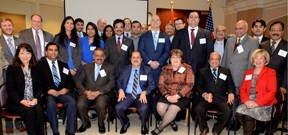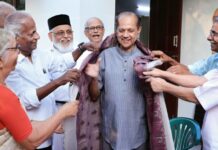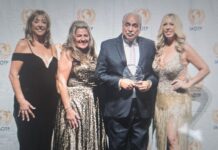
CHICAGO: The Consulate General of India, Chicago, organized an Economic Partnership Seminar “India and the Midwest in conjunction with the Chicagoland Chamber of Commerce on Wednesday February 17 at the Consulate office in Chicago Downtown. The event was attended by over 130 participants from Illinois, Indianapolis, Michigan, Minnesota, Missouri and South Dakota.
The seminar was divided into two panels – Panel One focused on discussions on an Overview of US-India Business Relations while Panel Two was on India and the US-Midwest Economic Partnerships.
Ms. Denise E. Harvill, Co-Chair of Global Connections Forum and Board Member of the Chicagoland Chamber of Commerce, welcomed the assembled guests and spoke of the existing ongoing cooperation between their Chamber and the Consulate.
The first panel comprising Dr Chirinjeev Kathuria, President and Chairman, New Generation Power, spoke about the changes taking place in India under the new government and the attractive prospects in future of doing business with India. He stressed that the energy and infrastructure sectors present huge opportunities in India.
The next speaker on the panel, Edward Weaver, J.D. C.P.A. Illinois and Manager, International Tax Services, Grant Thornton, mentioned about the tax policy in India and the taxes that would be applicable for US companies who open liaison offices, permanent establishment, branch offices, project offices or set up joint venture projects or partnership companies in India.
Dr Ausaf Sayeed, Consul General, outlined the present economic scenario in India, the state of economic reforms, the expanding infrastructure, economic initiatives taken by the new government led by Prime Minister Modi and its efforts to reduce red tape and expedite processes and transactions, the visa on arrival scheme, rationalization of subsidy on oil and gas, the Make in India campaign initiated by the Prime Minister of India to increase the contribution of manufacturing sector to the country’s economy, concept of Smart Cities, the Delhi-Mumbai industrial corridor, Swachh Bharat Abhiyan, Jan Dhan Yojana and Digital India.
Doug Potts, CGBP, International Trade Manager – Europe, Middle East & India, International Trade & Investment Office, Missouri Dept. of Economic Development, initiated discussions on the second panel mentioning that while interest in the Indian market has peaked during the last five years, exports from Missouri have grown significantly with the opening of their office in Pune in 2011. He informed that they would be trying for a visit by the Governor to India in 2016.
Raju Chinthala, President, Indianapolis-Hyderabad Sister City Committee, spoke on the Sister City relationships between Hyderabad and Indianapolis, known for their strengths and partnerships since 2010. He described the way by which such partnerships could be used to strategies economic development of such Sister Cities.
Ms Mel Bromberg, Principle, WaterSHED International LLC, spoke on the Swachh Bharat, cleaning initiative launched recently, stressing the importance of sanitation and allied infrastructure.
Seann Nelipinath, Chairman, India Chamber of Commerce, USA, spoke on the accompanying advances of the Make in India project and the business friendly changes that have been ushered in by the new government, leading to increased investment opportunities, trade and commerce and the US corporate and business expectations from the new government.
He pointed out that India was the only market that survived global economic crises, primarily due to its strong and stable economic base. He referred to the need to formalize incentives in the role that Midwest companies should foresee in India in the sectors of transportation, construction, education, skill, vocational and insurance centers as also in the pharmaceutical industry.
The last speaker, Sampath Ramesh, Lecturer of Global Initiatives in Management, Kellogg School of Management Northwestern University, stated that the new Prime Minister had recognized the importance of manufacturing in his Make in India project which was directly linked to national economic growth. He categorized the differences between the economic liberalization of 1992 vis-à-vis the present initiative. He also referred to the setting up of industrial corridors, the incentives available to potential investors and the opportunities for US Midwest companies.
The closing remarks were made by Ms Theresa E. Mintle, President & CEO of the Chicagoland Chamber of Commerce.
Ramesh Soparawala
India Post News Service






